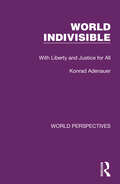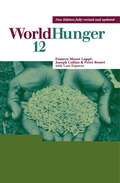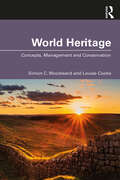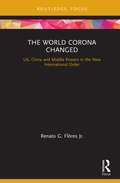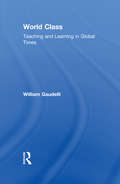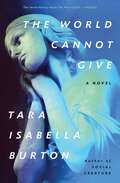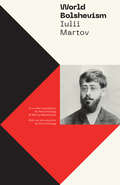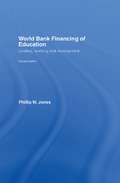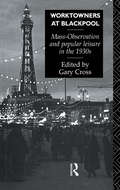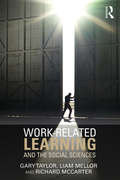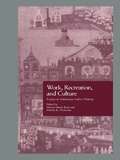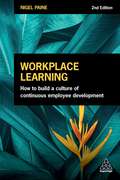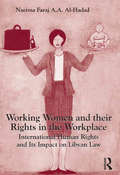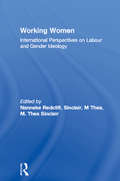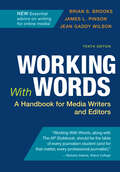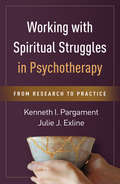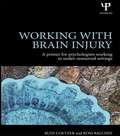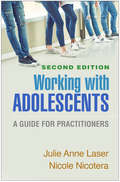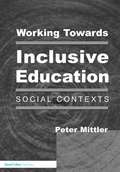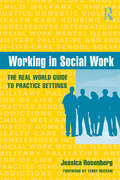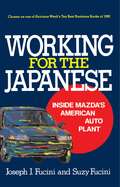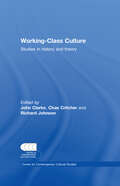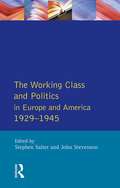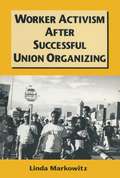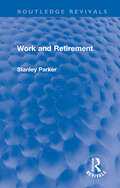Special Collections
Benetech’s Global Certified Accessible Titles
Description: Benetech’s GCA program is the first independent third-party EPUB certification to verify ebook accessibility. By creating content that is born accessible, publishers can meet the needs of all readers. Learn more: https://bornaccessible.benetech.org/
- Table View
- List View
World Indivisible
by Konrad AdenauerOriginally published in the UK in 1956, this book presents the essence of the political philosophy of one of Europe’s best-known post-war statesmen, as well as his experience in government as head of Germany in one of its most critical periods of history. The role of Germany in a (then) new Europe is discussed, along with its rearmament, its greatly restored economic power and its relation to NATO. Germany’s Chancellor gives his views on the world struggle, the cold war, Germany and America, Germany and Israel and the difficulties and responsibilities of the alliance of free nations.
World Hunger
by Joseph CollinsThe revised edition of this text includes substantial new material on hunger in the aftermath of the Cold War; global food productioin versus population growth; changing demographics and falling birth rates around the world; the shifting focus of foreign assistance in the new world order; structural adjustment and other budget-slashing policies; trade liberalization and free trade agreements; famine and humanitarian interventions; and the thrid worldization of developed nations.
World Heritage
by Simon C. Woodward and Louise CookeWorld Heritage: Concepts, Management and Conservation presents an insight into discussions and debates surrounding the UNESCO World Heritage List, and the properties on it. Since its creation 50 years ago, the World Heritage Convention has been lauded as one of the most successful international expressions of cooperation, whilst at the same time being widely criticised as producing an overly commercialised and globalised sense of heritage. Offering an in-depth discussion of both sides of the debate, this book explores these issues by discussing the following topics: • How the World Heritage Convention was conceived and how it is operationalised; • How the World Heritage concept is currently being used and misused; • The benefits of inscription – perceived and actual existential threats faced by World Heritage Site managers including climate change, urban development, overtourism, military action and natural disaster; • The future of World Heritage as an instrument for conservation and economic development. Case studies from a global range of World Heritage Sites are included throughout, to showcase some of the successes and also missuses of World Heritage status. This book will be of pivotal interest to students and scholars in the fields of tourism, heritage, archaeology, natural resource management and development studies.
The World Corona Changed
by Renato G. Flôres Jr.This concise book addresses the new geopolitical realm which will ensue from the coronavirus pandemic, exploring how the main international actors will position themselves in the post-Covid-19 realities. Contrary to some analysts, the author argues that, rather than an acceleration of existing or latent trends, the post-coronavirus world will present novel and otherwise unexpected features and challenges. Even the previously ongoing tension between the US and China will morph into an additionally complex and multidimensional puzzle, making it much more difficult to manage. In this book, the author provides a few basic tools for further analysis of the evolution of the new world situation, in an innovative way. Two main axes orient how analyses will be performed: the shape and evolution of the US–China relationship (and their interactions with other international actors), and the degree of co-operation — for example, on climate change and security arrangements — in the transformed world. The author suggests that the pandemic will be responsible for new emergences and fractures, and yet our ever more divided world will at the same time support unifying forces and links, highly dependent on technological developments being shared and/or protected. The primary objective of this book is to draw a broad picture which will serve as a frame of reference for analysing how the community of international actors will react to major challenges — be they expected or unanticipated — in the post-pandemic world. It will be of immense interest to analysts, academics, politicians and students of international relations, geopolitics, strategy, and world affairs.
World Class
by William GaudelliHow have school curricula been affected by the ripple effects of globalization? How do teachers and students attempt to understand their complex world? Most states require world teaching in some form, yet little is known about how teachers and students engage in this critical curricular area. World Class: Teaching and Learning in Global Times directly fills this need by providing a detailed, inside look at global education in three high schools. The data from the study, drawn from extensive interviews and observations, illustrate the daily challenges and complexities of global teaching and learning. Comprehensive yet scholarly, this volume: *raises thought-provoking questions for both theorists and practitioners; *addresses controversial issues embedded in global education and throughout the social studies curriculum, such as the tension between universalism and cultural relativism, the problematic nature of identity in classroom discourse, and the apparent duality of national and global loyalties; *connects issues particular to global education with wider scholarship in education; *examines the interplay of theory and practice in global education and, more broadly, the social sciences; and *provides an exploratory and provocative look at dimensions of global civics, with an analysis of the events of 9/11/01 and how they have shaped global perspectives about living as one planet. The book is organized in three parts--contexts, problems, and alternatives. Contexts allows readers to consider global education from multiple perspectives: teacher, student, administrator, community member, and scholar. Problems focuses on pedagogical challenges associated with global education. Alternatives provides reflection points that encourage readers to consider different ways we might converse about global teaching and learning. Written for scholars, practitioners, and students in social studies, curriculum and instruction, global/multicultural education, and related fields, World Class: Teaching and Learning in Global Times is an excellent text for preservice and graduate-level courses in these areas.
The World Cannot Give
by Tara Isabella Burton&“The Secret History meets The Price of Salt&” (Vogue) in this &“equal parts dangerous and delicious&” (Entertainment Weekly) novel about queer desire, religious zealotry, and the hunger for transcendence among the members of a cultic chapel choir at a Maine boarding school—and the ambitious, terrifyingly charismatic girl that rules over them. When shy, sensitive Laura Stearns arrives at St. Dunstan&’s Academy in Maine, she dreams that life there will echo her favorite novel, All Before Them, the sole surviving piece of writing by Byronic &“prep school prophet&” (and St. Dunstan&’s alum) Sebastian Webster, who died at nineteen, fighting in the Spanish Civil War. She soon finds the intensity she is looking for among the insular, Webster-worshipping members of the school&’s chapel choir, which is presided over by the charismatic, neurotic, overachiever Virginia Strauss. Virginia is as fanatical about her newfound Christian faith as she is about the miles she runs every morning before dawn. She expects nothing short of perfection from herself—and from the member of the choir. Virginia inducts the besotted Laura into a world of transcendent music and arcane ritual, illicit cliff-diving and midnight crypt visits: a world that, like Webster&’s novels, finally seems to Laura to be full of meaning. But when a new school chaplain challenges Virginia&’s hold on the &“family&” she has created, and Virginia&’s efforts to wield her power become increasingly dangerous, Laura must decide how far she will let her devotion to Virginia go. The World Cannot Give is a &“hypnotic and intense&” (Shondaland) meditation on the power, and danger, of wanting more from the world.
World Bolshevism
by Iulii MartovBeginning in 1903, the Russian Social Democratic Labour Party was divided into opposing sections, one led by Vladimir Lenin, the other by Iulii Martov. Until 1917, both Lenin and Martov were equally prominent figures in Russian politics. Martov, an anti-war socialist intellectual from a Jewish background, wrote prolifically for a number of important publications inside and outside Russia. Although the books, articles, and pamphlets written by Lenin during the same period remain readily available today, those by Martov are extremely hard to find in their original Russian or in translation. Following Martov’s untimely death in 1923, a Russian-language edition of one of his books, World Bolshevism, was published. But it was only in 2000, after decades of extreme censorship, that parts of the book were legally published in Russia. In English, this work has reached the public in pieces, often as a part of pamphlets with limited circulation. This edition, which includes an introduction by Paul Kellogg that contextualizes the work and reintroduces Martov as an important thinker to a twenty-first century readership, makes Martov’s work available in its complete form for the first time in a hundred years.
World Bank Financing of Education
by Phillip W. JonesBased on detailed analysis of thousands of confidential World Bank documents, this book demonstrates that the World Bank lies at the centre of the major changes in global education of our time. It outlines the evolution of World Bank lending policies in education, and assesses the policy impact of the Bank's educational projects, looking at how it has: shaped the economic and social policies of many governments, including policies that affect education been an influential proponent of the rapid expansion of formal education systems around the world, financing much of that expansion been instrumental in forging those policies that see education as a precursor to modernisation served as a major purveyor of Western ideas about how education and the economy are, or should be, related. Following on from the success of the first edition, this revised edition covers topical issues of globalisation and looks into the political debate concerning aid to developing countries. It will be of enormous value to those studying, or working in, educational policy in developing countries, international organisations and financial institutions, and aid agencies.
Worktowners at Blackpool
by Gary CrossGary Cross publishes the findings of this largely forgotten study by the Mass-Observers who followed the annual pilgrimage of labourers to Blackpool, hoping to discover what attracted workers to this centre of Victorian culture.
Work-Related Learning and the Social Sciences
by Gary Taylor and Liam Mellor and Richard McCarterWork-Related Learning and the Social Sciences provides a clear and accessible introduction to the theory and practice of work. Written in a student friendly style, it makes use of the following: Theoretical Perspectives: The theoretical foundations of identity, power, community, citizenship, experiential learning and a range of employability skills provide frameworks for the chapters. Key issues: The book addresses such issues as: How are people socialised at work? Why does conflict occur at work? What types of control are exerted at work? What can we learn about our communities from the work we do? How can we develop our employability skills? Sector examples: Extensive use is made of examples of the working practices of teachers, social workers, police officers, civil servants, third sector workers as well as from people engaged in low skilled work. The student voice: The student voice draws upon the relationship between their own experiences of work and the key issues covered in the book. Written as an introductory text for students studying the social sciences, it deals with the ways in which students can appreciate the sociology and politics of work and develop an understanding of their own skills and employability. This book is particularly relevant to students studying work-related learning as part of their social science degrees and to those who wish to enhance their employability and prospects in graduate level employment.
Work, Recreation, and Culture
by Martin Henry Blatt and Martha K. NorkunasThe essays in this volume focus on the role of women in the work force. They explore how organized sports, social associations of all kinds and the educational system faced by the children of worker were profoundly linked to work place and community activism. They examine why radical labor organizations that could win major strikes often could not sustain themselves as permanent institutions. Finally, the essays argue that simultaneous leadership changes in management and labor in the auto industry were less the result of internal conflicts than needed structural adjustments to changing economic and political realities. Interwoven into all of the essays is the intricate dynamic between immigrant and native-born, between different immigrant waves and the groups, and between workers at different skill levels. Work, Recreation, and Culture enriches and expands the established labor narratives.
Workplace Learning
by Nigel PaineHow can I develop an effective workplace learning culture to drive employee and business success? This new edition of Workplace Learning provides the knowledge and tools to create an outstanding learning culture in the new world of work.It's no longer enough for Learning and Development professionals to only offer a catalogue of workplace learning courses: competing effectively in today's business environment requires organizations and their employees to adapt and learn daily. Providing an evidence-based model for identifying key areas of focus and measuring success, Workplace Learning is a practical guide that shows how to build and embed a culture that continuously encourages and engages employees in learning and achieve business success. The updated second edition features new material on organizational and self-determined learning, and case studies from Microsoft, Novartis and PwC. Packed with practical suggestions, tools and tips, Workplace Learning is an essential resource for establishing an outstanding continuous learning culture in all parts of the organization.
Working Women and their Rights in the Workplace
by Naeima Faraj Al-HadadThis book addresses women’s rights to work and motherhood in Libya from a legal and international human rights perspective. In an attempt to solve the problem posed by the perception that there is an unsolvable conflict between the right of women to work and their right to motherhood, the author considers how these two sets of rights, as protected under international human rights law, can and should be recognised and promoted within the Libyan legal system. Including first-hand accounts of experiences of Libyan women, the study voices their struggle for their rights as guaranteed by domestic law, international conventions and Islam. Providing a rare insight into a region striving to find its new identity, the author assesses the adequacy of existing Libyan laws and, where warranted, offers proposals for legislative amendments to Libyan policy makers and its new Parliament at such a crucial time in the nation’s history.
Working Women
by M. Thea Sinclair and Nanneke RedcliftAs the female labour force continues to expand, the terms on which women participate remain a considerable problem. Working Women presents a detailed examination of women's position in the paid workforce in a variety of first and third world countries and identifies the common cultural and economic factors which create disadvantage.
Working With Words
by Jean Wilson and Brian Brooks and James PinsonRegardless of the medium, from print to broadcast to PR to digital, Working with Words has you covered. With a focus on improving skills in both grammar and style, this book serves as an invaluable reference for students throughout their academic and professional careers. Helping students become better journalists and media writers, the text combines news writing acumen with good, journalistic form, covering the full spectrum of writing skills from understanding basic methods of style and writing to mastering English grammar and mechanics.
Working with Spiritual Struggles in Psychotherapy
by Kenneth I. Pargament and Julie J. ExlineDoes my life have any deeper meaning? Does God really care about me? How can I find and follow my moral compass? What do I do when my faith is shaken to the core? Spiritual trials, doubts, or conflicts are often intertwined with mental health concerns, yet many psychotherapists feel ill equipped to discuss questions of faith. From pioneers in the psychology of religion and spirituality, this book combines state-of-the-art research, clinical insights, and vivid case illustrations. It guides clinicians to understand spiritual struggles as critical crossroads in life that can lead to brokenness and decline--or to greater wholeness and growth. Clinicians learn sensitive, culturally responsive ways to assess different types of spiritual struggles and help clients use them as springboards to change.
Working with Brain Injury
by Rudi Coetzer and Ross BalchinThis book provides a hands-on resource for the development of essential skills and competencies in clinical neuropsychology. On a very practical level it addresses a question frequently asked by students, trainees, interns, and newly qualified psychologists: what do I need to know in order to perform the everyday tasks involved in clinical neuropsychology? The authors distil, from a vast knowledge base, the practical skills and knowledge needed to lay the foundations for working with brain-injured patients, especially within the developed and developing world where time and resources are limited. The book is divided into three main sections: Basic Foundations, Clinical Practice, and Professional Issues. Together these sections cover 18 fundamental topics, each representing a key part of the life of a practitioner. Each chapter contains practical tips, points for reflective practice, and suggested further reading, with a particular emphasis on issues pertaining to working in under-resourced clinical environments. The book draws upon landmark academic papers and textbooks, and also the authors’ experiences of working in state hospitals in both South Africa and the National Health Service in the United Kingdom. Working with Brain Injury will be essential reading for clinical psychology trainees and their supervisors, for newly qualified psychologists in clinical settings, and for students and practitioners in other clinical professions seeking an introduction to clinical neuropsychology.
Working with Adolescents, Second Edition
by Julie Anne Laser and Nicole NicoteraNoted for its multisystemic–ecological perspective, this accessible text and practitioner resource has now been revised and expanded with 60% new material. The book provides a comprehensive view of adolescent development and explores effective ways to support teens who are having difficulties. The authors examine protective and risk factors in the many contexts of adolescents' lives, from individual attributes to family, school, neighborhood, and media influences. Assessment and intervention strategies are illustrated with diverse case examples, and emphasize a social justice orientation. Useful pedagogical features include end-of-chapter reflection questions and concise chapter summaries. New to This Edition *Incorporates current research on brain development, resilience, gender diversity, mental health care, and more. *Chapters on new topics: the adolescent brain, trauma, and suicide and self-injury. *Fully rewritten chapters on substance use, queer youth, justice-involved youth, and the joys of working with adolescents. *Reflects the unique contexts and challenges facing Generation Z.
Working Towards Inclusive Education
by Peter MittlerThis book provides a clearly written, wide-ranging overview of current key issues and challenges arising from the implementation of more inclusive policies and provision in education in this country and internationally. The author sets policies for inclusive schools in the broader contexts of current policies which aim to reduce poverty and social exclusion, and the wider global background of the United Nations drive to promote 'Education for All'. The book draws a distinction between integration and inclusion and provides a critical analysis of the government's Program of Action and the revised National Curriculum and their implications for schools, pupils and families.
Working in Social Work
by Jessica RosenbergAfter graduating, students in social work are faced with the daunting and stressful decision of choosing their specialty from the many that are available to them. JessicaRosenberg has designed this guidebook to make this process easier, providing students with real world and practical information about what it is really like to work as a social worker. Each chapter covers a different practice setting, such as child welfare, gerontology, and addictions, and follows the same format. The Field Overview and Forecast describes the social worker’s role, scope of services, and emerging issues and employment trends. The Critical Issues section consists of an interview with an established professional in his or her chosen field, offering a look into their personal journeys as they progressed through their careers. A vignette written by a practitioner in their area of specialty makes-up the First Person Narrative, providing the reader with a look at the joys and challenges of working in that particular field. Each chapter then concludes with helpful resources to learn more, such as books and websites, as well as information about specialty credentials and educational programs and centres. Those entering the social work field will find this an indispensible guide as they select their specialty and begin their career.
Working for the Japanese
by Joseph J. FuciniThis book is the product of two years of research and over 150 interviews with workers and managers at the Mazda-Flat Rock plant, UAW representatives, state and local government officials, and residents of the Downriver area.
Working Class Culture
by CccsFirst published in 2013. Routledge is an imprint of Taylor & Francis, an informa company.
Working Class and Politics in Europe and America 1929-1945, The
by John Stevenson and Stephen SalterThis volume contains a series of essays which examines various regimes and working classes of such countries as Italy, France, Poland, the USA, the Soviet Union and Great Britain in the early 20th century.
Worker Activism After Successful Union Organizing
by Linda MarkowitzShows how different levels of worker participation during a union organizing campaign influence the perceptions and actions of those same workers after the campaign ends, and, thereby, the long-term effectiveness and success of the organizing effort. Drawing on historical and current examples, the author analyzes the political and economic contexts within which today's unions are organizing, including a detailed examination of the impact of the Wagner Act.
Work and Retirement
by Stanley ParkerIn the early 1980s world recession and widespread unemployment had accentuated an existing trend – more people retiring from work early and living longer after doing so. Some were adequately prepared for a life of well-earned ‘leisure’ in retirement, but too many were not. The policies of employers, unions and governments on retirement needed to be challenged in societies where work opportunities were collapsing but where leisure activities and values were not yet strong enough to take their place. Originally published in 1982, Dr Parker, a sociologist, provides a careful and critical examination of what we knew about retirement and discusses possible alternative answers to the various problems involved at the time. The history of retirement is first considered, followed by a conceptual analysis of types of retirement. There are chapters on preparation for retirement, the capacity of older people to work, and on the varying experiences of retirement. Separate consideration is given to the question of work after retirement age and whether retirement is actually experienced as leisure. The concluding chapter examines various policy alternatives for dealing with the problems raised earlier in the book. Work and Retirement was intended for students of industrial sociology and industrial psychology, for personnel and human resource professionals, for trade unionists and for all those who had an interest in understanding the developments in the field of retirement and the older working population. Now it can be read in its historical context.
